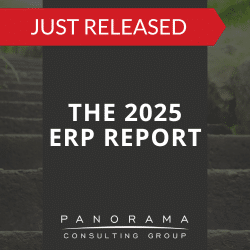What is a value added reseller of ERP software? This is a company that provides different features or services than the ERP vendor it represents. A value added reseller (VAR) has goals aligned with the vendor, but it also has its own unique goals, typically related to some sort of niche focus.
Why would you engage a VAR? One instance where a VAR is helpful is during ERP selection. You may find a solution that is a great fit overall, but you need to customize or supplement it to fit all your business requirements.
Today, we’re discussing how VARs work and why you might need one. In addition to the benefits, there are also risks that you may incur by partnering with a VAR. We’ll explore this, as well, so you can make an informed decision.
Clash of the Titans 2021
This report analyzes some of the notable differences between SAP, Oracle, Microsoft and Infor.
What is a Value Added Reseller?
A value added reseller, in general, is a company that supplements and enhances products developed by other companies. Typically, they buy products directly from distributors and original equipment manufacturers (OEMs). Then, they make those products more valuable and resell these augmented products as complete, turnkey solutions.
This is a common practice within the IT industry where components are often sold independently of one another. For instance, a particular software application might require hardware, but the vendor doesn’t include that in their package.
In addition to adding physical parts to a product, a VAR may also supply additional services that enhance the ROI of your investment. Such professional services may include:
- Integration
- Customization
- Implementation
- End-User Training
Software VARs can also develop custom applications for vendors’ products to help these products better conform to a user’s needs. To do so, they will source necessary components from a variety of vendors, using them to build a new system. Then, they will resell it as a complete package.
Understanding these features, it’s easy to see how the term “value added reseller” came about. These entities add additional value to products beyond the cost of the individual components.
5 Benefits of Hiring a VAR for Your ERP Implementation
For most businesses, the tasks required to select, learn, implement, and maintain an ERP system can be daunting. This is especially the case if your business requires features above and beyond an out-of-the-box ERP solution.
If this applies to your company, you might need to select a VAR in addition to selecting ERP software. Why should you make the extra effort? Here are some of the benefits a VAR can provide:
1. Access to Specialization
An ERP value added reseller doesn’t just configure products at random. Rather, they have invested in the personnel, knowledge, and resources required to offer a truly specialized approach to your ERP implementation.
They know how to research, analyze, and implement various technology solutions to an extent that often surpasses the capabilities of an individual vendor. Plus, their loyalties aren’t always tied to a particular solution.
2. Access to In-Depth IT Knowledge
A dedicated project team is essential to ERP implementation success. However, these team members are still employees with day-to-day jobs. Even if they’re fully dedicated to the project, the IT learning curve can be steep.
An ERP VAR, on the other hand, is well-versed in the technological aspects of implementation. They’ve spent time researching available solutions, attending industry training events, and having in-depth discussions with vendors.
3. Streamlined Integration
An ERP value added resller doesn’t just understand the specific ERP solution you’re considering. They’re also familiar with other forms of hardware and software, including some of the components you already have.
This means they can help guide you toward a solution that will seamlessly integrate with your existing applications, as well as any you might install down the road. In this capacity, they can serve as your systems integrator.
4. Customer Service Benefits
If you have questions about your ERP software, it can be frustrating to reach out to the vendor directly. It’s all too easy for these monolith enterprises to play telephone tag.
Conversely, most VARs are small businesses. This means they’re often easier to contact and quicker to respond. You’ll likely work with the same point of contact throughout the life of your project, so you always know who to call.
5. Additional Services
We’ve mentioned it before, but a VAR is far more than a software reseller. They can also help you engineer the perfect solution and customize it according to your ERP requirements.
In other words, they’ll work with you to understand how you want to interact with the system and what you expect it to do. Then, they’ll adjust it to fit those expectations.
This approach ensures your employees can start using the ERP software as soon as it goes live.
3 Risks of Hiring a VAR for Your ERP Implementation
There’s no denying a VAR can help your ERP implementation run more smoothly and boost your return on your investment. Yet, before you start reviewing your options and signing on the dotted line, it’s important to consider this decision from all angles. Here are a few risks of hiring a VAR:
1. Additional Costs
As you may expect, hiring a VAR will usually cost more than simply purchasing ERP software from a vendor. While these extra expenses can provide value, they also could strain your ERP budget. Therefore, we recommend weighing these costs against the benefits.
2. Long-Term Viability Concerns
The attributes that make value added resellers so approachable also make them risky.
While a downside of vendors might be their size, this is also a benefit because it means they’re solidified in the industry and are financially secure. This gives you the confidence that they’ll be around next year, and the year after that. You can also rest assured that they’ll stand behind their products if something goes wrong.
The same can’t always be said about a VAR. These companies might win your trust based on their small-team mentality, but you’ll want the heavyweights in your corner if anything goes south.

Thoughts From Alan Salton, Panorama's Director of Innovation
Microsoft has many VARs that each have their own market and industry expertise. In many cases, they even have their own intellectual property, such as extensions specifically for engineer-to-order companies or business intelligence capabilities specially developed for professional services firms.
Some of our clients worry about the long-term viability of such VARs, and we understand this concern. We know there is a possibility of a VAR going out of business or stopping support for a certain product. This is especially risky if you select packages from multiple vendors.
3. Upgrade Challenges
When you trust your system build to a VAR, you may not know exactly what it contains or what’s been done to it. This might not matter at first, but it can turn into a major roadblock when your system needs an upgrade.
Relying on a custom-built system usually means returning to the VAR for ongoing maintenance and support, which is cost-prohibitive for many organizations.
Should You Hire an ERP Value Added Reseller?
What is a value added reseller, and should you add one to your project team? If you’re on the fence, understand that there isn’t a right or wrong answer that applies to all companies.
In many ways, a VAR can enhance your implementation. The software can be custom-built around your specifications and include everything you need for a turnkey solution. In addition, the VAR’s expertise means you don’t have to spin your wheels learning complex IT concepts.
However, before you rush into this decision, take the time to weigh the risks, too. A VAR can add costs and risks to your project, and it’s important to account for these before getting started.
If you need help navigating this decision, feel free to reach out to our team of ERP consultants. Contact us below to schedule a free consultation.













